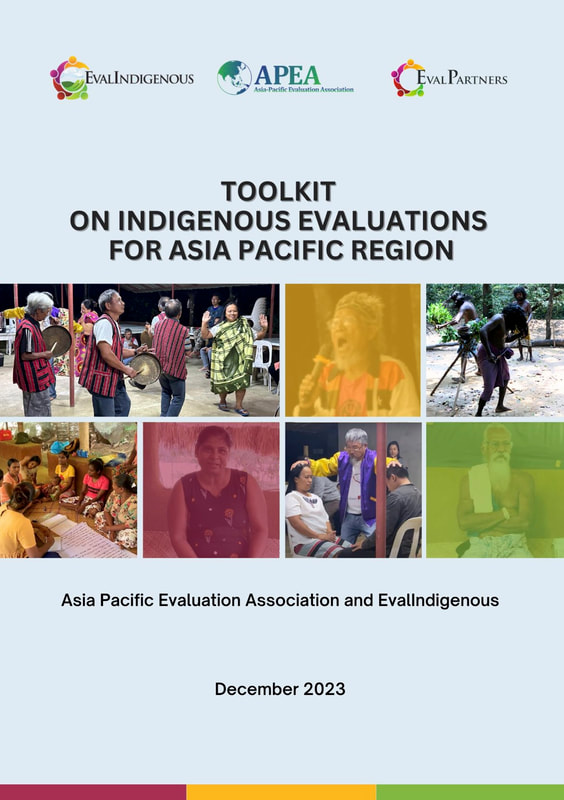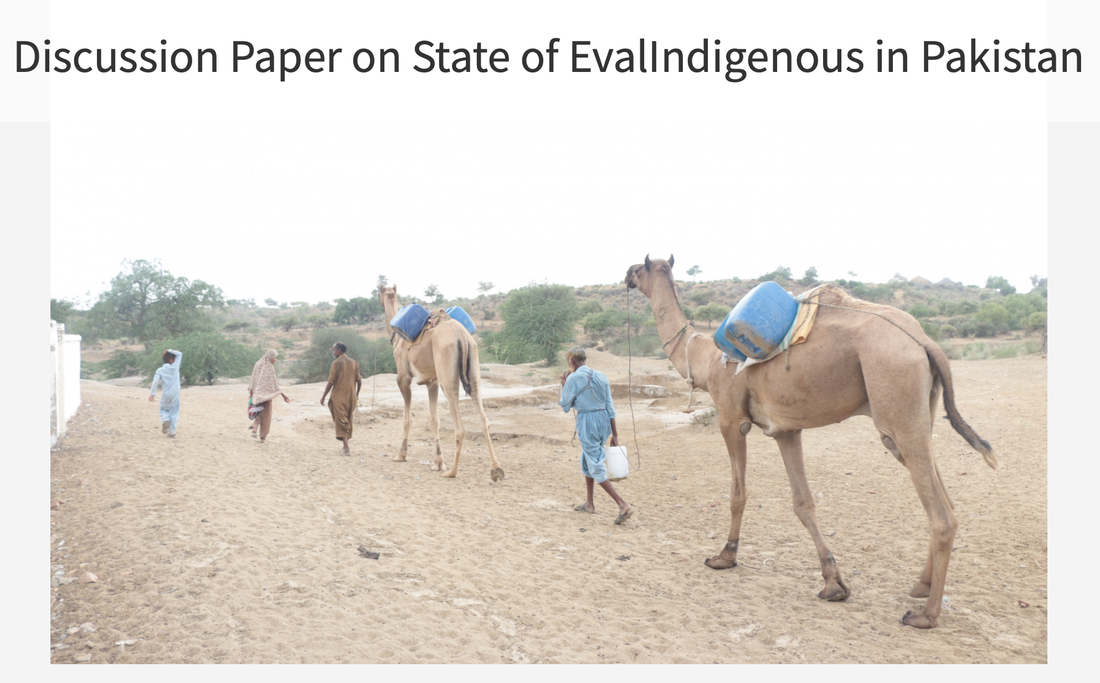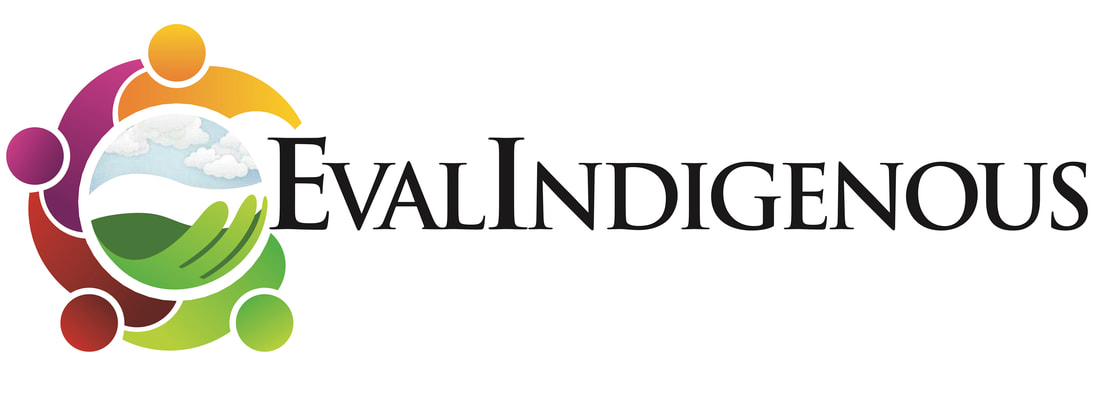|
|
Solomon Gitau Waiyego, Understanding Taboos in the Agikuyu Community, KenyaAt our July EvalIndigenous meeting, Solomon shared his 2023 Seeding Grant project findings on taboos and talked about his plans for his 2024 project work. The recording includes his presentation as well as the discussion that followed.
|
Almas Mazigo's papers on the Swalihi wisdom and evaluation are now available in volume 12(2) of the African Evaluation Journal, 2024 |
APEA on #gLOCAL2024: Strengthening Indigenous Evaluation in Nepal towards Transformational Change |
This Year We Are All Going To DieJohn Njovu has written about Zambia's drought and its impact on evaluation practice:
Part 1. The wrath of the ancestral spirits and nature Part 2. Broken down family ties Part 3. The shadow economy Part 4. The disempowerment of clan heads by British colonialist |
Toolkit on Indigenous Evaluations for Asia Pacific RegionThe Toolkit developed by APEA from their EvalIndigenous program of work in 2023 is now available. In addition to describing the methodology of their programme of work and reporting on the fieldwork and conference panel, the Toolkit describes five lessons learned from this work about Indigenous evaluations in the Asia Pacific region:
|
Asia Pacific 2023 Seeding Grants
|
Community of Evaluators – Nepal (CoE-Nepal). Workshop on Indigenous Evaluation, 6 August 2023, Kathmandu Nepal.
|
EvalYouth Pacific. Knowledge Sharing Workshop, 20th - 21st September 2023, Fiji.
|
Kalahan Education Foundation (KEF)Intergenerational Tongtongan for the Continuity of the Ikalahan Heritage, 17-18 August 2023, Santa Fe, Nueva Vizcaya, Philippines.
|
Nepal Evaluation Society (NES). Orientation Program on Evaluation for the Parliamentarians from the
Indigenous Nationalities, 13 August 2023, Kathmandu, Nepal. |
|
|
|
|
|
Researching Indigeneity and decolonising evaluation: Activities to enhance the cultural responsiveness of evaluation
Dr Awuor Ponge and colleagues have been visiting and talking with Indigenous peoples in Kenya. Getting to know these peoples, including the challenges they face, is an important step in working to ensure that evaluations with them are culturally responsive. This work follows on from Dr Ponge's 2021 Indigenous African Protocol for Evaluations.
PONGE, Awuor & ODUOR Wycklif Ochieng’ (2023). Researching Indigeneity and decolonising evaluation: The Ogiek peopleThe Ogiek people, an Indigenous hunter-gatherer community residing in Kenya's Mau and Elgon forests, are a community of southern Nilotic speakers. The Mau Forest serves as their cherished home, a source of knowledge, a defining aspect of their cultural identity, and the very essence of their way of life, instilling within them a deep sense of pride and purpose.
|
PONGE, Awuor & MURIGO, Grace Wanjiru (2023). Researching Indigeneity and decolonising evaluation: The MijikendaThe Mijikenda are among the Indigenous peoples of Africa who have contributed greatly to the country’s cultural identification for many years. They are recognized for their traditional music, folk tales, literature, and diverse arts. They are also recognized for their strong sense of belonging, and the remarkable knowledge of their history and culture.
|
PONGE, Awuor (2021). Indigenous African
|
PONGE, Awuor & MURIGO, Grace Wanjiru (2022). EvalIndigenous visit with the Mijikenda of Kwale County, KenyaDr Awuor Ponge and Grace Wanjiru Murigo report on their conversations with BintiHamisi Ali MNYENZE; Khamisi Juma MWAVIKO; Sanaa Suleiman KUBAMBANYA & Shabaan NDEGWA. This project used the Indigenous Navigator, adapted to suit the specific context of the case, as a tool for monitoring and evaluating Indigenous peoples’ rights and development in Kenya.
|
10 Questions Indigenous Communities Should Ask Evaluators
|
In 2021, EvalIndigenous came up with 10 questions we think Indigenous communities should ask evaluators, including: who do you know in this community? and Will we have a say in the evaluation? These questions have been designed to support Indigenous communities to get to know evaluators and to figure out how to engage with them. These questions can start conversations and won't be the be-all-and-end-all of what Indigenous communities might want to know about evaluators and the work they would like to do. Fiona gave a presentation on the 10 questions in a 2022 SLEVA webinar.
|
|
PONGE, Awuor (2022). Report on the American Evaluation Association Conference, 2022Dr Awuor Ponge reports on his attendance at the AEA conference in New Orleans, November 2022.
NJOVU, John T. (2021). EvalIndigenous visit to Nyalugwe Chiefdom, ZambiaThe main objective of this visit was to continue researching and collecting local stories to promote indigenous evaluators’ voices.
PONGE, Awuor (2020). EvalIndigenous Voices Project: AfricaPowerpoint presentation about the Indigenous Voices project participants from Burkina Faso, Ghana, Mali, Nigeria and Tanzania.
NJOVU, John T. (2019). EvalIndigenous presentation at Ngoma Dolce Music AcademyPowerpoint presentation about EvalIndigenous to the Ngoma Dolce Music Academy, Lusaka, Zambia.
EvalIndigenous (2019). Introducing EvalIndigenous and acknowledging the importance of Indigenous Evaluation for the Sustainable Development Goals (SDGs)This is EvalSDGs Pop-Up Note 7, written by EvalIndigenous to introduce itself to the EvalPartners network and to discuss the importance of the SDGs.
NJOVU, John T. (2018). EvalIndigenous visit to Chiengi and Puta districts, ZambiaThe visit to Chiengi and Puta districts in Zambia was based on the 2018 Voice Project’s Plan. Chiengi is about 1,200 kilometres north of Lusaka near the border with Congo. Chiengi and Puta are rural towns and far from the densely populated parts of Zambia.
Visit to Sri Lanka in 2018 by Serge Eric Yakau and John T. NjovuFrom 14th to 20th September 2018, EvalIndigenous delegates Serge Eric Yakeu & John T. Njovu represented the network at EvalColombo2018, Global Parliamentarians Forum For Evaluation conference in Colombo. Prior to the conference, the team completed a two-days site visit in the Dambana village to meet and interview the community leaders and other key informants.
|
SLEvA (2020). Rathugala Non-Commercialized Indigenous Community in Sri LankaThe project team visited Rathugala from 2nd to 5th September 2020 for the data collection with the community and key stakeholders. The project team conducted 11 key informant interviews that included the leader and deputy leader of the Rathugala Indigenous community, Grama Nildhari, Samudhri Officer, religious leaders, school principals, Monaragala District project manager for the Central Cultural Fund, and representative from the Vedda Heritage Center Rathugala. Additionally, the team conducted two focus group discussions (FGDs) with men from the indigenous community and two FGDs with women from the indigenous community. Also, the team conducted a FGD with the police officers of the area. In addition, the team conducted field observations of the houses and cultural rituals of the indigenous community at Rathugala.
PEA (2020). Discussion Paper on State of EvalIndigenous in PakistanPEA (Pakistan Evaluation Association) gathered expert evaluators from all the hard to reach areas in Pakistan and initiated a discussion on the importance of amplifying local voices, culture and religious practices throughout the evaluation cycle. The project aimed to gather a pool of evaluators, as well as enumerators from all the provinces of Pakistan and put them online on its website for anyone commissioning or conducting evaluation or dissemination activities in such regions. We hope that this activity will not only promote indigenous evaluation in the country but will also have direct impact on the quality of the evaluation results and its utilisation.
Goodwin, D. & Bremner, L. (2018). EvalIndigenous VOPE survey reportIn November and December 2017 a survey of VOPEs (Voluntary Organisations for Professional Evaluation) was implemented by the EvalIndigenous Committee to:
1) gain a better understanding of VOPE’s engagement with Indigenous Evaluators (IE) and Indigenous Communities (IC) in their countries and regions 2) create a platform for moving forward in supporting VOPE’s to further develop their awareness of, and support for Indigenous evaluation, Indigenous evaluators and Indigenous communities |










